Katy Lee is a freelance journalist based between Paris and London, and host of the award-winning podcast “The Europeans.”
RÉDANGE, France — In the sleepy town of Rédange, near the French border with Luxembourg, residents woke up one morning last October to an eerie and impressive sight: a mountain of decomposing waste.
They were not entirely surprised. For months, former mining and metal-working towns on the French side of the border had witnessed illegal garbage dumping, often in the middle of the night. Trucks arrived on the outskirts of towns laden with everything from plastic and food packaging to construction rubble and old washing machines.
In this region of northeastern France, Europe’s open borders seem to be facilitating a growing business in illegal garbage-dumping.
The town of Haucourt-Moulaines is now home to a 500-metric-ton mountain of illegally dumped garbage, while others have appeared in nearby Hayange, Hussigny and Audun-le-Tiche.
“These places aren’t under surveillance, and there’s no street lighting at night They’re perfect dumping grounds” — Gaultier Berera, local resident
“I just don’t understand how people can do this,” said Jessica Dautruche, who reported the grim discovery in Rédange to the police. “We’re not in the Middle Ages. This shouldn’t be happening.”
The 43-year-old former care worker combed through the trash pile, which backs onto her neighbor’s garden, hoping to find clues about its origins. It didn’t take her long to draw a connection with Brecht, a Belgian town on the outskirts of Antwerp. Gas station receipts, invoices, takeout flyers — they all indicated the garbage had come from there.
When she first called the local authorities, “they just didn’t want to hear about it,” said Dautruche. “And because it took ages to even get the authorities to come and take a look at it, it just kept growing.”
Since the first few truckloads were deposited in Rédange three months ago, the culprits have visited numerous times, adding to a festering heap that now weighs more than 200 metric tons and stretches tens of meters across.
A barrier on the road between Rédange and Villerupt forbids people from dumping trash
“These places aren’t under surveillance, and there’s no street lighting at night,” said Gaultier Berera, another local resident. “They’re perfect dumping grounds.”
* * *
For people and companies looking to get rid of waste that would be expensive to dispose of legally, these border towns have long been an ideal place to quickly and quietly get rid of garbage. Dotted by disused quarries, factories and processing sites that have lain empty since the 1980s or longer, there is a plenty of space and little oversight.
Perpetrators were usually individuals from across the border, who might fling a few black garbage bags out of their cars to avoid fees for producing too much waste, or bar owners and construction workers surreptitiously dumping their bottles and rubble in the forest in order to skip their own fees.
The kind of large-scale organized dumping that is taking place today is new, authorities say.
“There’s been a real explosion in the amount of waste crossing the border over the past two years,” said Thomas Daguin, the customs chief of France’s northern Lorraine region whose patrol covers parts of France’s borders with Belgium and Germany as well as Luxembourg.
Traditionally, he said, French customs officers carrying out vehicle checks near the border have been on the lookout for drugs or trafficked cigarettes. But increasingly, they’ve been stumbling upon cars loaded with garbage instead.
“If there’s hazardous material in there — batteries, paint — this can leach and pollute the groundwater and the soil” — Ioannis Bakas, waste expert
In 2017, Daguin’s agents reported 7 metric tons of waste illegally trafficked into France. A year later, this had shot up to 139 metric tons — about the weight of a blue whale. The 2019 figures are not yet available, but Daguin said they are likely to confirm the upward trend.
It’s unclear why the dumping has increased so rapidly, although officials suggest it may be linked to the rising cost of proper waste treatments.
This is not the first time that European garbage has gone astray despite some of the most stringent waste-disposal legislation in the world. In 2018, the U.K.’s Daily Telegraph reported that thousands of metric tons of British plastic waste were being imported to Poland by a “trash mafia” and burned instead of recycled.
When gendarmes and customs officers from France and Luxembourg launched a coordinated crackdown on vehicles carrying waste across the border in late January, they found 2.5 metric tons in just a couple of hours. Daguin said he has increased patrols on roads often used by polluters, and law enforcement agencies on both sides of the border have started exchanging intelligence on the issue.
French authorities in November opened a criminal investigation into the industrial-scale dumping operation taking place in towns like Rédange.

Gautier Berera stands in front of a mound of decomposing garbage
While the investigation is still in its early stages, a man caught driving a dump truck full of waste in October told police he worked for Belgian logistics company named Mondial Services, according to Rédange Mayor Daniel Cimarelli and head of the local towns’ association Andre Parthenay. Few traces of the firm can be found online, although the Brussels-based company is listed as active on business registries.
Mondial Services did not respond to multiple attempts to contact them. At the firm’s registered address in central Brussels — which is home to a corporate domiciliation service that registers and hosts mailboxes for dozens of businesses in exchange for a monthly fee — the office manager confirmed Mondial Services is still headquartered in Brussels, but told POLITICO his team has had a hard time trying to reach the company in recent months.
In December, another driver was questioned by police after he was found dumping garbage in Hayange, the officials said. He also said he worked for Mondial Services, but the waste itself came from another Belgian firm, Snoeys Recyclage, which promises “fast and proper” waste treatment on its website. Snoeys is based in Brecht, the town whose name appeared on all the receipts and junk mail found by Dautruche on the trash heap. A company representative said the company did not wish to comment on the case to the media.
A third company, the Luxembourg-based transport provider Jost Group, became caught up in the investigation after it emerged that its vehicles had been used to dump waste across the border. The company apologized for its involvement in a statement on its website and insisted it had no idea its trucks were being used to dump waste illegally. “We have worked with the police to stop this,” a spokesman said. “We take environmental issues very seriously.”
* * *
Meanwhile, the trash heap in Rédange continues to rot. Like the garbage mountains in neighboring towns, it sits on land that is privately owned, which means that it is officially the owner’s responsibility to sort it out. But disposing safely of this already-putrid waste could cost hundreds of thousands of euros. Unsurprisingly, the owner has so far decided to let it sit there.
Rédange Mayor Daniel Cimarelli says he is worried the town’s image will suffer from its unwelcome new landmark. “My town is not a garbage dump,” he said, surveying the mass of rotting household waste deposited on what used to be the town’s iron ore-processing site.
He’s frustrated by a lack of interest from authorities in addressing the waste problem, he said. The issue is complicated by the fact that his town sits between two French départements as well as on the border of two countries. “That has made difficult to know who’s in charge of sorting this out,” he said.
“Once upon a time there were [systematic] customs checks here — trucks couldn’t just come and go like this,” Cimarelli added. But in spite of it all, the mayor refuses to blame open borders for what has happened.

Jessica Dautruche is concerned about the impact of the trash on local wildlife
“My roots are French, Belgian, Luxembourgish, Italian — I am a convinced European,” he said. “But I would like Europe to see this problem.”
There are health concerns to worry about too.
“If there’s hazardous material in there — batteries, paint — this can leach and pollute the groundwater and the soil,” said Ioannis Bakas, a waste expert at the European Environmental Agency. Landfill sites filter out this liquid so that it can be treated properly. In the illegal dumping sites, there’s nothing to stop this toxic juice from seeping into the many small streams that feed into the Alzette River. The Moulaine Valley, where some of the waste has been dumped, is a protected natural site.
Dautruche, the former care worker, admits she is particularly galled by the potential impact on wildlife. She has little hope that the problem is going to be resolved any time soon.
If there’s a very grim upside, it’s that living next to such a stark symbol of over-consumption has encouraged her to check her own habits.
“I really try to consume as little as possible — I make my own cleaning products, my own beauty products,” she said. “Our actions have consequences. We have to open our eyes to them.”